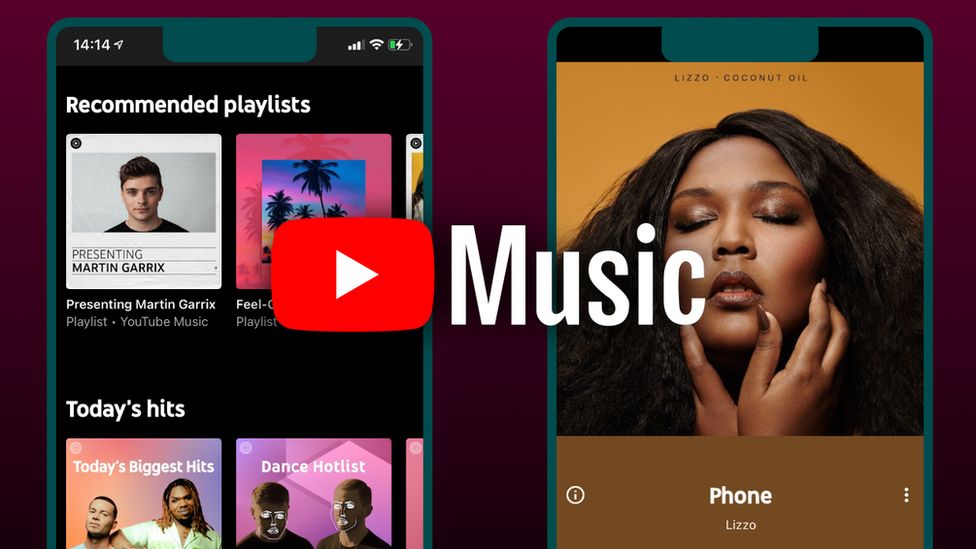YouTube Music: Google to axe Play Music in October
- Published

Google will shut down its Play Music service in the UK in October, to focus on its newer YouTube Music app.
Google Play Music failed to attract as many subscribers as rivals such as Spotify and Apple Music, despite being pre-installed as the default music app on millions of Android phones.
YouTube Music will offer more than 60 million songs to stream, but will not have a download store to buy music.
One analyst said focusing on the YouTube brand was the "right strategy".
"Part of the issue with Google Play Music was branding. The messaging was very confused," said Joseph Evans, head of tech at Enders Analysis.
"They changed the name several times. There was Google Play All Access, YouTube Music Key, and it speaks to the underlying issue that this has not been an area of focus for Google."
'It was tough'
Google Music was launched in 2011. It let users store their existing music collection in the cloud, and buy more songs to download. It was later rebranded Google Play Music and added music streaming in 2013.
"We were the only game in town when it came to collecting all your music in one place," Brandon Bilinski, now head of product for YouTube Music, told the BBC.
But the reality was that few people, especially younger users, needed to upload music to the cloud. A streaming service was enough for them.
He agrees that the decision to brand the service Google Play Music was "interesting" because "Google doesn't scream entertainment and media".
Google then launched YouTube Music as a competing product in 2015.
"It was tough because there was this little internal competition about where you put your focus," said Mr Bilinksi.
The company merged the two development teams in 2017, leading to a discussion about which music app should prevail.
"We made the decision that it really only made sense to have this exist in YouTube," he explains.
Google Play Music will be switched off in October, and anybody still using the app will have until December to transfer their playlists and purchases over to YouTube Music.
Mixed results
Google struggled to attract subscribers to Play Music, with analysts consistently ranking it behind Spotify, Apple Music and even Amazon Prime Music.
This time, the plan is to blend a traditional music-streaming service with songs that Google's algorithms have dredged up on YouTube.
It produces some interesting results.
For example, the top playlist for S Club 7 is a series of shaky, distorted cameraphone videos from a concert, rather than the high-quality audio you might want to listen to while cleaning the kitchen.
But the second playlist features rare tracks and B-sides uploaded to YouTube by fans, that are not otherwise officially available on music-streaming services.
One neat feature for premium subscribers is the ability to switch seamlessly between song and music video, which can help cut out the long preamble that some artists open their videos with. (No shade, Lady Gaga).
The free tier of the app peppers video advertisements in between songs.
Strangely, they are quite often just a musical jingle with no narration.
One ad for a tablet computer featured only the sound of elephants trumpeting for 15 seconds.
That may work fine if you're watching videos on YouTube, but it's useless on a music service if you're not looking at the visuals.
So, still a few wrinkles to iron out before Google Play Music's burial in October.
As well as offering more than 60 million songs from major record labels, YouTube Music also pulls in audio content from the video-sharing side of YouTube.
Mr Bilinski said a music-classifying algorithm helped decide what content ended up in YouTube Music, while stopping other content from "leaking in".
Unlike Google Play Music, YouTube Music offers free music streaming in more than 80 countries.
But the company will no longer offer music purchases, and will not integrate podcasts in YouTube Music.
Mr Evans said Google's track record with branding did not "fill me with hope that the messaging is going to be super clear".
"Spotify does one thing well, which is music streaming. There is a risk if you dilute the proposition with a product like YouTube, with user-generation videos.
"But YouTube already has tens of millions of paying subscribers. It's going in the right direction to be a big player."